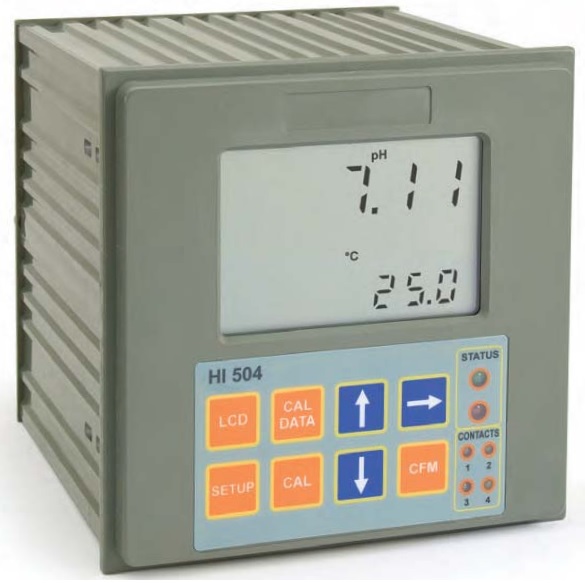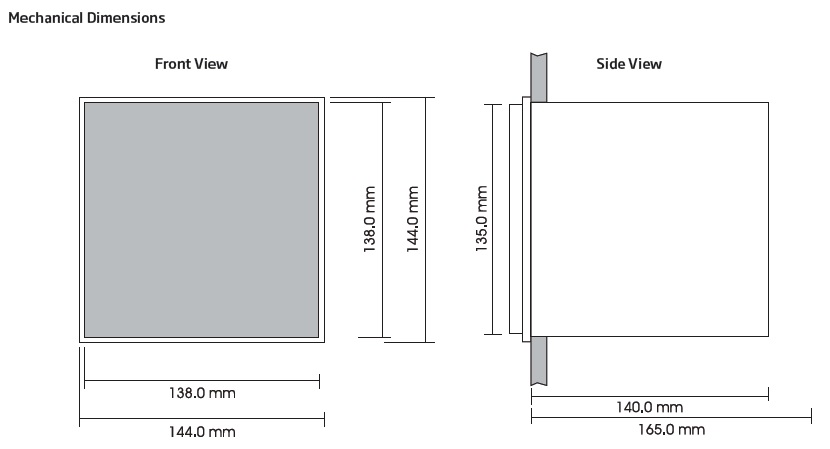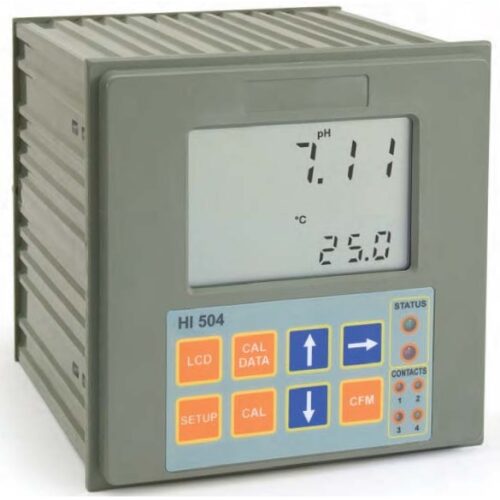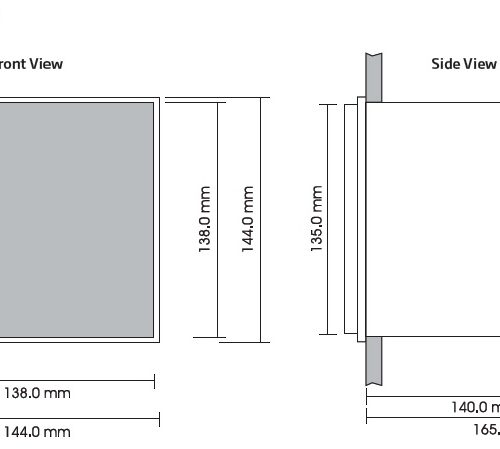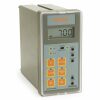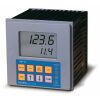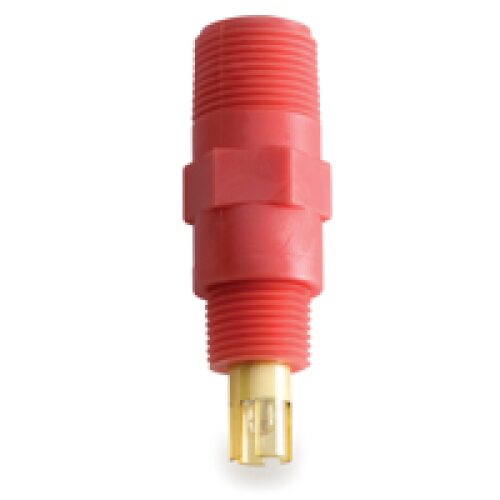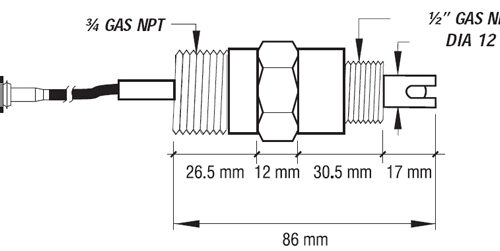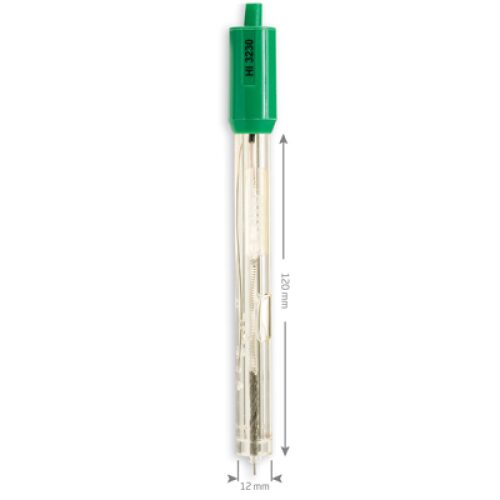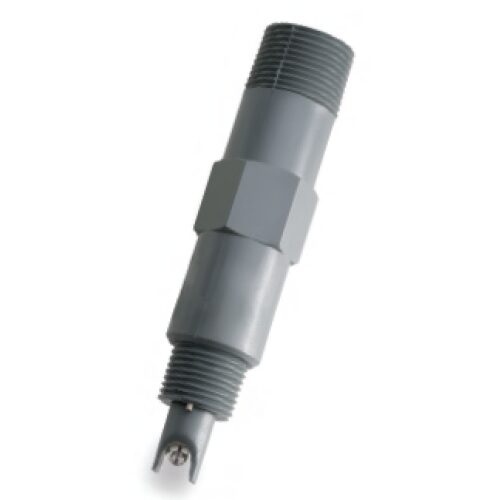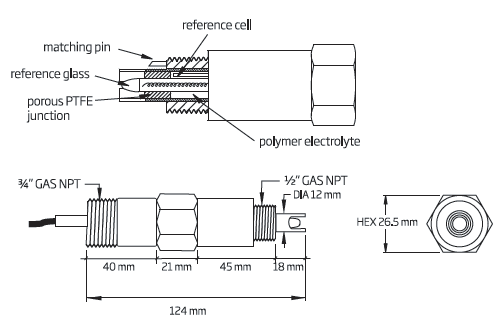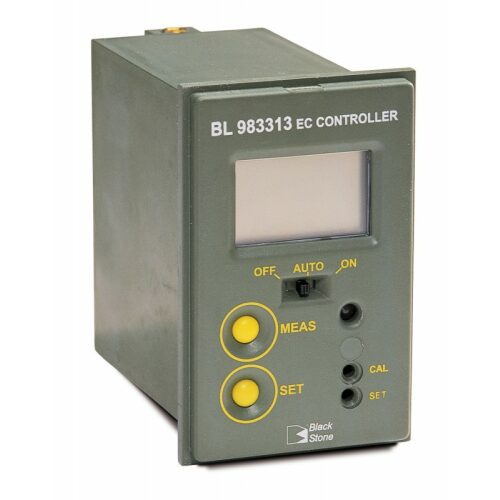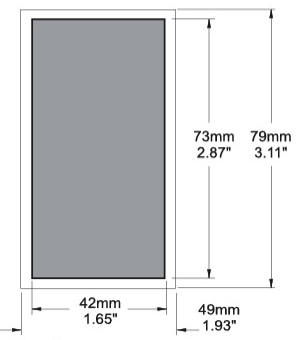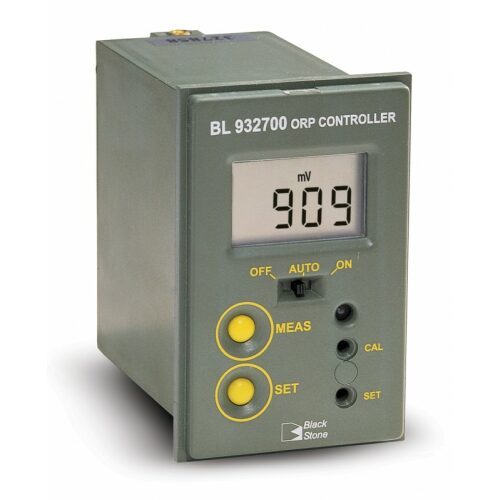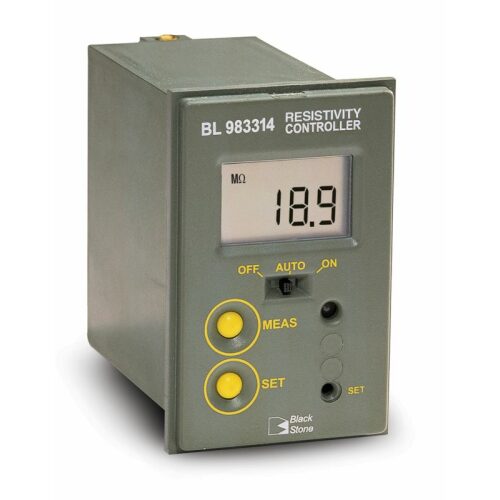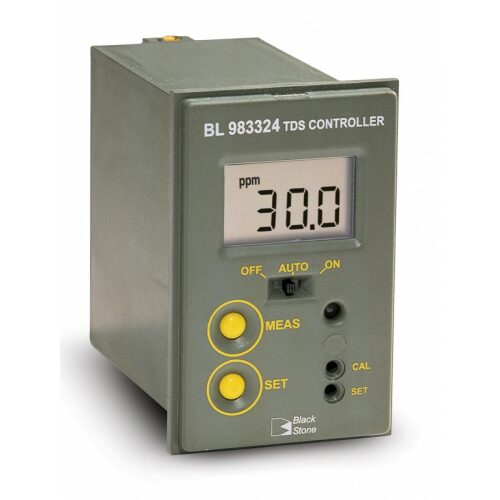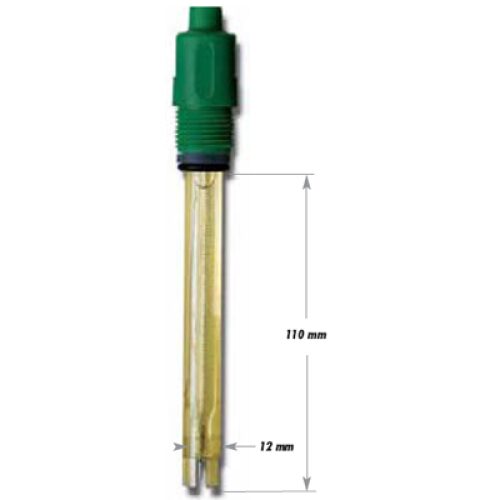No products in the cart.
HI504112-2 pH/ORP Controller – 1 setpoint / digital and analog output
฿40,660.00
HI 504 is a PID, PI, proportional or on/off pH/ORP controller with one or two set points. The measurement configuration settings and control of pH and ORP are saved separately and permits users to switch between pH and ORP without losing settings. The pH channel can be calibrated in 2 calibration points. The instrument has a full auto diagnostic procedure. Sensor Check™ is also available for pH and ORP probes.
Out of stock
SKU: HI504112-2
Categories: All Product, Process controllers
PID, PI, proportional or ON/OFF control of pH or ORP for one or two set points
- Sensor Check™ for a real-time pH/ORP electrode status monitoring
- Digital transmitter or direct connection of the probe
- Matching PIN to eliminate the ground loop effect
- Automatic temperature compensation for pH
- Logging of up to 100 system events and up to 6000 readings (pH, ORP, T)
- Control performed with up to 4 relays or analog output in 0-20 or 4-20 mA
- Automatic probe cleaning from alarm or user request
HI 504 is a PID, PI, proportional or on/off pH/ORP controller with one or two set points. The measurement configuration settings and control of pH and ORP are saved separately and permits users to switch between pH and ORP without losing settings. The pH channel can be calibrated in 2 calibration points. The instrument has a full auto diagnostic procedure. Sensor Check™ is also available for pH and ORP probes.
The temperature is continuously monitored using a temperature sensor (Pt100 or Pt1000 type) with automatic temperature compensation of pH.
One or two analog controller outputs (0-20 or 4-20 mA) can be configured for pH/ORP recording or controlling (only for models with PID), and relays can be used to control the process or be connected with alarm status.
Controller status is visable with LED’s on the front panel and on LCD.
The controllers logging feature can save up to 6000 samples pH/°C or ORP and last 100 error, configuration, calibration and cleaning events. This information can accessible from a PC through RS485 and HI 92500 software. The powerful HI 92500 software has graphing capabilities and can print graphs directly or can be saved as a bitmap. Data can be exported in common spreadsheet formats.
Sensor Check™ pH/ORP
Sensor Check™ performs self-diagnostic and troubleshooting functions by continuously verifying the electrode status based on impedance movement of the glass and reference measurement. The internal circuit of the instrument executes two independent tests, one for the probe and one for the reference chamber, measuring the respective impedance values every 5 seconds. These tests last for a very short period to avoid electrolysis and polarization, which can be caused by a prolonged exposure to an electric current. The types of problems identified by Sensor Check™ are: pH electrode broken, reference electrode dirty, reference electrode or matching pin not immersed, clogged or dirty electrode junction, short-circuit between cables of pH and reference electrodes, signal problems from the cable or connector due to humid or dirty environments. The test is not limited to a simple signal that indicates an error in progress, but it reports the nature of the problem with a specific error code.
Analog Output: Data Logging or PID Dosage Control
Models are available with one or two analog outputs. These outputs can be connected to a recorder for the catalogging of process data (pH/mV and temperature), or can be used for controlling dosing systems (pumps or electrovalves) using PID control.
Logging of the Last 100 Events
With the HI 504 series, it is possible to recall the sequence of the last 100 occurred events at any time: errors, calibrations performed, set parameter changes and cleaning cycles. Every code shown on the display corresponds to a certain type of event, error, or operation.
Programmable Cleaning Cycles
Heavy-duty applications often require almost continuous probe maintenance. Elements such as suspended solids, fat, oils, pigments and microorganisms can quickly deposit and soil the glass bulb of a pH probe, the sensor of an ORP probe or the reference junction. To solve these problems, the HI 504 series has been equipped with an automatic cleaning system (simple or advanced, depending on model) with programmable cycles. The cleaning cycle is a simple wash with either water or detergent, programmed by setting the rinse time and the pause length. The advanced cleaning uses both water and detergent, and allows the user to program three stages, with the possibility to vary the sequence, the time, and the number of cycles. The advanced mode can also be triggered at any time from a remote control or through the isolated digital input on the rear panel, which can be connected to an external switch.
The controllers can also automatically activate both cleaning modes whenever Sensor Check™ reveals a soiled probe. A delay time can be set before restarting the reading after a cleaning cycle has taken place; this allows the probe to adjust to new operating conditions.
Programmable Hold System
The hold function allows the user to stop the regulating action of the controller for programmable time periods. It is possible to activate the hold periods in correspondence to programmed operations, such as plant maintenance and cleaning procedures.
Fail Safe Alarm System
HANNA’s exclusive Fail Safe Alarm System protects against problems caused by power supply failure or signal interruption, which are typical risks in industrial environments. The system acts both on a hardware and a software level. The alarm relay functions in a normally closed condition, and is tripped when there is a power failure if, for example, the power cable is accidentally cut. This function is very important in industrial plants where alarms are usually not activated if there is a power supply interruption, which can cause serious damage due to a loss of control of the process plant. At the software level, the Fail Safe function activates an alarm in case of abnormal circumstances, for example if the dosing contacts remain closed for an excessive period. The alarm condition is also indicated by a red LED, located directly on the front panel of the controller.
HI 504112-2 single setpoint, on/off control, single analog output, 230V
Order Information:
Each HI 504 model is supplied complete with mounting brackets and instructions.
Product Manuals
![]() Manual: Download
Manual: Download
Specification :
| Range | pH | -2.00 to 16.00 pH |
| ORP | -2000 to 2000 mV | |
| Temperature | -30 to 130.0°C | |
| Resolution | pH | 0.01 pH |
| ORP | 1 mV | |
| Temperature | 0.1°C (above -10 °C); 1°C (below -10°C) | |
| Accuracy @ 20°C | pH | ±0.02 pH |
| ORP | ±2 mV | |
| Temperature | ±0.5°C (-9.9 to 130.0°C); ±1°C (-30 to -10°C) | |
| Input Impedance | 1012 Ohm | |
| Digital Input for the pH/ORP/°C Transmitter |
RS485 | |
| Other Digital Insulated Inputs |
two digital insulated inputs: one for hold and one for the advanced cleaning; ON state: 5 to 24 VDC | |
| Digital Insulated Output |
a digital insulated contact closed upon hold mode | |
| Temperature Compensation |
automatic or manual, -30 to 130°C | |
| Temperature Probe | with three-wire or two-wire Pt100/Pt1000 sensor (with automatic recognition and damage test) | |
| Power Supply | 230 VAC ±10% ; 50/60 Hz | |
| Power Consumption | 10 VA | |
| Over Current Protection | 400 mA 250V quick blow fuse | |
| Max. Oscillation Frequency |
8 MHz | |
| Relays 1, 2, 3, 4 | electromechanical relay SPDT contact outputs, 5A-250 VAC, 5A – 30 VDC (resistive load); fuse protected: 5A, 250V quick blow fuse | |
| Alarm Relay | electromechanical relay SPDT contact output, 5A – 250 VAC, 5A – 30 VDC (resistive load) fuse protected: 5A, 250V quick blow fuse | |
| Analog Output | one independent outputs, 0 – 22 mA (configuring as 0-20 mA or 4-20 mA) | |
| Analog Output Resolution |
0.1% f.s. | |
| Analog Output Accuracy |
± 2% f.s. | |
| Data Logging | 6000 pH/°C or ORP samples | |
| Environment | 0 to 50°C?(32 to 122°F); RH max 85% non-condensing | |
| Casing | IP20 (housing); IP54 (front panel) | |
| Weight | 1.6 kg (3.5 lb.) |
Related products
All Product
฿10,165.00
Flow-thru monitoring ORP electrode with BNC connection and 3 m cable.
All Product
฿8,881.00
ORP glass electrode with single diaphragm, designed for drinking water quality controls.
฿0.00
HI1002 - pH electrode, flow-thru monitoring, BNC, 3 or 5 m cable, high-pressure applications.
฿13,910.00
Blackstone BL983313-1 Mini Conductivity Controller, 0 to 1999 ĩS / cm, 115/230 V Water treatment, heating and air conditioning systems, cooling towers, surface technology, Simple industrial processes
฿15,515.00
Blackstone BL932700-1 ORP mini controller, -1000 to +1000 mV, 4-20 mA recorder output, 115/230 V
฿15,515.00
Blackstone BL983314-1 resistance mini-controller, 0.00 to 19.90 MΩ / cm, 115/230 V Water treatment, heating and air conditioning systems, cooling towers, surface technology, light industrial processes
฿13,910.00
Blackstone BL983324-1 TDS (total dissolved solids) mini controller, 0.0 to 49.9 mg / L, 115/230V. Water treatment, heating and air conditioning systems, cooling towers, surface technology, light industrial processes
All Product
฿5,885.00
Spare ORP Electrode for HI 981406 and HI 982401 ORP Indicators.
